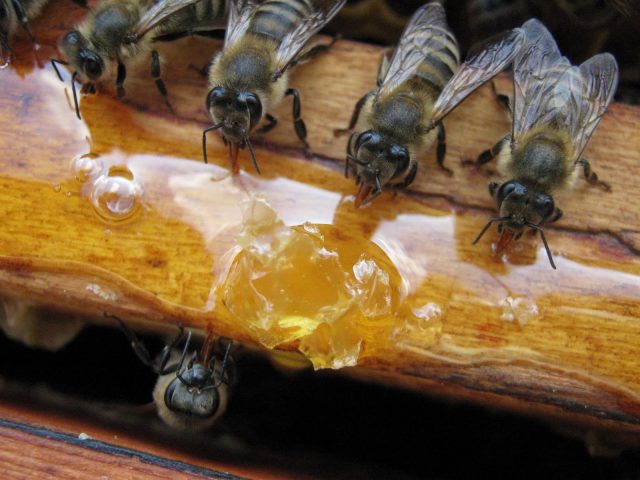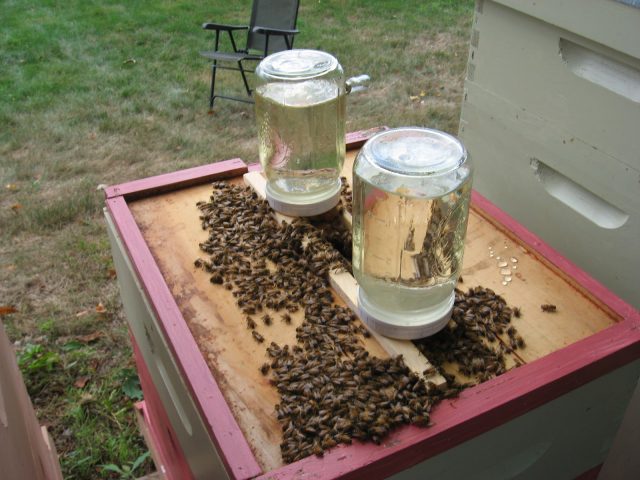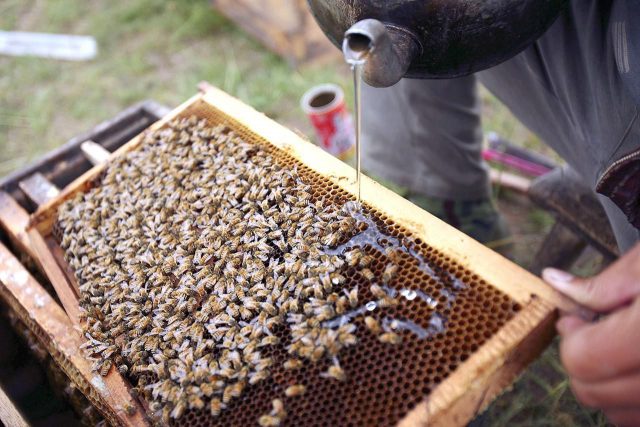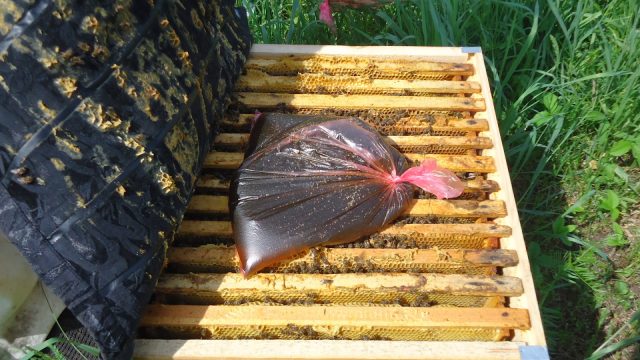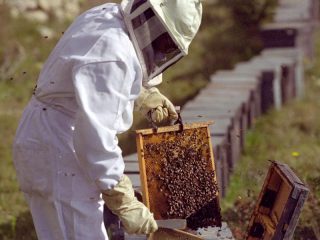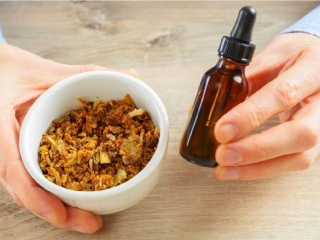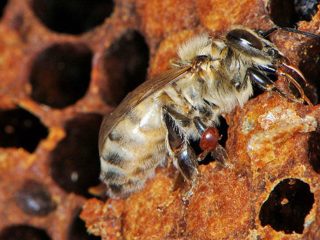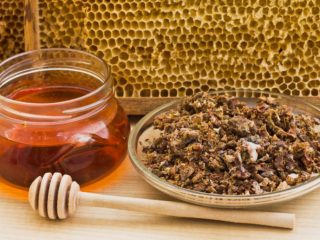Content
Feeding the bees in the fall with sugar syrup is carried out in the case of poor honey production, a large volume of pumping, if the bees did not have time to prepare a sufficient amount of product for wintering or poor quality honey. Top dressing in the fall is given at a certain time, observing the cooking technology.
Goals and objectives of the autumn feeding of bees with syrup
Feeding families in the fall is necessary to create a sufficient amount of food for the swarm to winter. The best option is honey. Feeding the sugar syrup to the bees in the fall helps preserve the bee product so that the maintenance of the apiary is commercially viable. There are a number of special cases when feeding in the fall is necessary:
- The location of the apiary is far from honey plants - insects have stocked up honeydew honey, a toxic product for them. It is completely removed from the hives, replaced with a sugar solution. If nectar crystallizes, bees do not seal it, it is also removed.
- The rainy summer prevented insects from flying out for a bribe, they did not collect the necessary volume of nectar for honey production.
- Substitution measure after pumping out.
- Poor flowering of honey plants.
- Sugar syrup is prepared for bees in the fall with the addition of a medicinal product in order to treat the swarm.
In the Central regions, with poor honey harvest, incentive feeding is used in the fall, which stimulates the instincts of the family. Measure is necessary if the uterus has stopped laying early. Sugar feed is given in small portions, the receiving bees in the hive perceive it as a bribe, begin to intensively feed the queen, which, in turn, resumes laying. For this purpose, the observance of proportions is irrelevant.
What syrup to give bees in autumn
The classic cooking option is used and with a variety of additives. The choice depends on the climatic conditions of the region, on the wintering place and the state of the swarm. Main types:
- traditional, consisting of sugar and water - it includes the necessary additives or is given in pure form;
- inverted - based on natural honey;
- honey fed - a syrup is prepared for feeding in the fall in a certain proportion of water and honey, used to stimulate the uterus to lay eggs.
Its preparation does not take much time and does not bring significant material costs. Such food is given only to a strong family, the weakened one is reinforced with frames from another hive.
Top dressing is carried out:
- with the help of special feeders;
- give the required amount of product, do not abuse it, otherwise the family will stop harvesting nectar on their own;
- sugar for cooking is of good quality;
- in good weather, the best processing of the solution for honey takes place at a temperature of 200 C;
- to exclude theft, complementary foods are given in the evening, after the harvesters return to the hive.
Do not give the solution hot.
How to make bee syrup in the fall
The preparation of complementary foods requires adherence to a strict ratio of water and sugar.The bees are fed in the fall with sugar syrup prepared in accordance with the proportions. A too thick solution can crystallize when placed in the honeycomb. Beekeepers use the product in different concentrations. In addition to the classic one, inverted food is prepared for weaker families.
Sugar syrup for bees in the fall: proportions + table
Strong families spend the winter safely. Pickers wear out over long distances. Young insects in the hive spend a lot of energy to process and seal the honey in the honeycomb. To unload them, feeding is carried out with a sugar product in the fall.
Cooking technology:
- They take only white sugar; yellow cane sugar is not used for feeding.
- Water is poured into the container, brought to a boil.
- Sugar is introduced in small portions, constantly stirring.
- Keep the mixture on fire until the crystals are completely dissolved.
- To prevent burning, the liquid is not boiled.
Cooled to 350 C are fed to families. It is recommended to take soft water. Hard accelerates the crystallization process, it is pre-defended for 24 hours.
Table for the preparation of sugar syrup for autumn feeding bees:
Concentration | Finished product volume (l) | Water (L) | Sugar (kg) |
70% (2:1) | 3 | 1,4 | 2,8 |
60% (1,5:1) | 3 | 1,6 | 2,4 |
50% (1:1) | 3 | 1,9 | 1,9 |
The inverted sugar solution is given in the fall to a weaker swarm. Insects spend less energy on processing into honey, the survival rate of bees after wintering is higher. The bee product does not crystallize, it is better absorbed by insects. Feeding preparation:
- A 70% solution is made from sugar.
- For the autumn feeding of the bees, honey is added to the syrup in a ratio of 1:10 (10% of the total honey).
- Bring to a boil, stirring well.
The mixture is removed for 1 week for infusion, before distribution to the hives, it is heated to 300C.
How to make vinegar syrup for bees in the fall
The nectar from the honey plants brought to the hive has a neutral reaction, like the autumn feeding. Finished honey has an acidic reaction. Autumn feeding with sugar syrup with vinegar is more readily accepted by bees, they spend less energy for processing and clogging them into honeycombs. The acid in the solution accelerates the breakdown of sugars, greatly facilitates the work of insects.
Used for the preparation of 80% essence with the calculation of 0.5 tbsp. l. for 5 kg of sugar. Beekeepers prefer apple cider vinegar as an additive, it supplements the feed with microelements and vitamins. The swarm tolerates wintering better, the uterus begins laying eggs earlier. A sugar solution is prepared at the rate of 2 tbsp. l. vinegar per 1 liter of product.
How to cook hot pepper syrup for bees in the fall
Bitter pepper is added to top dressing in the fall for the prevention and treatment of varroatosis. The family responds well to the component, pepper improves digestion, mites cannot tolerate the additive. The tincture is preliminarily prepared:
- Finely chop 50 g of red fresh pepper.
- Put in a thermos, pour 1 liter of boiling water.
- Insist day.
- Add 150 ml of tincture to 2.5 l of solution.
The autumn feeding of the bees with sugar syrup with hot pepper stimulates the queen to lay eggs, mites shedding from the bees is noted. They give the product to the swarm with the calculation of 200 ml per 1 street.
How to feed sugar syrup to bees in the fall
The main task of feeding is so that the family hibernates with a sufficient amount of food. Feeding the bees with honey in the fall is impractical, therefore they give a sugar product. The amount is calculated taking into account:
- What climatic zone is the apiary in? In a cold, long winter, food is needed in greater volume than in the southern regions.
- If the hives are on the street, insects will spend more energy on heating, respectively, the supply of food should be in abundance, the apiary located for the winter in Omshanik the product will cost less.
- A family formed with 8 frames uses honey more than a wintering one with 5 frames.
Frames installed for the winter must contain more than 2 kg of the sealed bee product.On average, one family accounts for up to 15 kg of honey. In autumn, the sugar solution is given 2 times more than the missing norm. Part of it will go to insect food during processing, they will seal the rest into honeycombs.
The timing of the autumn feeding of bees with sugar syrup
Top dressing begins after the completion of honey collection and pumping out of the bee product. Artificial nectar is given in August, work is completed no later than September 10. The timing is dictated by the insect's life cycle. Bees processing raw materials spend a lot of energy, which they will not have time to restore before winter. Most of the individuals will die.
If raw materials enter the hive throughout September, young bees that have recently emerged from the brood will be involved in its processing, they will weaken by winter, in the spring the bee will be added to the hive. The uterus will perceive the flow of nectar as a full-fledged bribe and will not stop laying. The kids will come out too late, in cold weather the young will not have time to fly around, the feces will remain on the combs. The swarm of honey will not take from this framework, the family is doomed to death, if not from hunger, then from nosematosis.
Ways to feed bees in autumn with sugar syrup
In beekeeping, the feeder is a must for completing the hive. Feeding attachments come in different types and with all kinds of installation options. Feeder options:
- The entryway is installed on a board near the entrance of the bees into the hive; it consists of a small wooden box, divided into two sections, in one of them a container with food is placed.
- Miller's feeder is installed on the top of the hive, it has a passage for the bees.
- A frame device in the form of a small wooden box, wider than the frame, the edge protrudes from the hive, it is placed near the nest.
- An open method of feeding, when liquid is poured into a small container and placed near the entrance to the hive.
- The bottom feeder is installed closer to the rear wall inside the hive, food flows from the container through a hose, the bottom of the device is equipped with a float so that insects cannot stick.
A commonly used traditional method of container feeding. Glass jars are used, the liquid is held in vacuum. The device is installed over the bees, the feed comes out of the pre-made small holes.
Autumn feeding of bees with sugar syrup in bags
Autumn sugar feeding for bees can be carried out in strong plastic bags so that the material does not break:
- The prepared food is poured into a bag, released air, tied 4 cm above the liquid.
- An impromptu feeder is placed on top of the frames.
- The cuts for the exit of the feed can be omitted. Insects will gnaw through the thin material themselves.
- A single dose is calculated in accordance with the number of bees in the colony. A swarm of 8 frames per night processes about 4.5 liters of raw materials into honey.
Observing the bees after the autumn feeding with syrup
During the autumn feeding, the family's behavior is constantly monitored. The phenomenon is quite rare, when the substituted honeycombs remain empty, insects do not show activity. The sealed honey in the old frames is not enough to feed the swarm, and the sugar solution in the feeder remains intact.
Why bees don't take syrup in the fall
There are a number of reasons why bees do not take syrup in the fall, it is necessary to identify and eliminate them. A common reason for refusing to process a sugar product is:
- The appearance of a strong bribe, as a rule, in August, from the honeydew, the bees switch to honey collection and do not take additional feeding.
- Bee triggering and a large brood area. A weakened insect will leave the transfer of artificial nectar in favor of heating the children.
- The spread of infection inside the hive, sick individuals will not be engaged in stockpiling.
- A spoiled (fermented) product will remain intact.
- Late time for feeding, if the air temperature is about +100C the bee stops taking bribes.
- Do not exclude the appearance in the hive of a foreign smell from mice or from the material of the container into which the liquid was poured.
One of the major reasons for rejection is the uterus. Before the end of the main honey collection in bad weather, the uterus stops laying and does not resume it during feeding. Worker bees wear out and leave, young bees are not enough to carry and process artificial nectar.
Another reason why the feeding remains intact is the old uterus with the end of reproductive life. There is no new brood, the old individuals have worn out on the honey harvest, the swarm is weak, there is practically no one to winter, such a family will not take additional feeding and is unlikely to overwinter. If, when determining the cause and eliminating it, the insects still do not process the solution, the swarm is fed with candy.
Conclusion
Feeding the bees in the fall with sugar syrup is a necessary measure to provide sufficient food for the swarm for wintering. Activities are carried out after the main honey collection and pumping out of the bee product. Beekeepers rarely practice the method of wintering on a natural product, there is a risk of falling nectar into the stock and developing nosematosis. The processed sugar product is more easily perceived by the digestive system of insects and is a guarantee of a safe wintering with a minimum amount of death.
